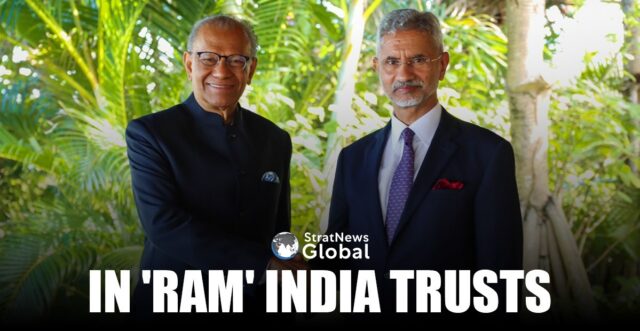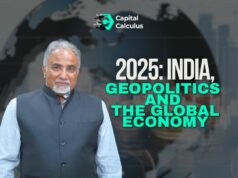After sweeping 60 out of the 62 seats in the recent parliamentary elections in Mauritius, the Labour Party, with its partners (Alliance du Changement) has returned to power. Navin Ramgoolam, the leader of the alliance, is back as prime minister for the fourth time, after the 1995, 2005 and 2010 general elections.
Navin Ramgoolam’s earlier tenures have been periods of excellent ties with India, and growth of the relationship in multiple dimensions. In his previous stints, Ramgoolam shared a good relationship with Indian leaders across the political spectrum, be it HD Deve Gowda, Atal Bihari Vajpayee, LK Advani (as Deputy PM), Manmohan Singh and also the current Prime Minister Narendra Modi, after he was sworn in for his first term in 2014.
Money Matters
Ramgoolam is a Mauritian of Indian heritage and belongs to the politically influential Hindu community. (In Mauritius, the Hindus are predominantly identified as a social and political group rather than only in the religious sense of the term). His father Sir Sewosagoor Ramgoolam was the first PM of Mauritius after the colony gained independence from Britain in 1968. Like his father, Navin Ramgoolam has solidly backed closer political, economic and people to people ties with India. In particular, Mauritian leaders have appreciated the economic spinoffs Mauritius gained over the years due to the steady growth of the Indian economy, since the 1990s.
In his early stints, Ramgoolam recognised the importance of the bilateral Double Taxation Avoidance Convention (DTAC) with India. That helped Mauritius emerge as the largest source of Foreign Direct Investment to India in the early decades of the 21st century. The strong investment flows helped spring up the Mauritian financial sector and boosted its economy in periods of global economic slowdown after the crash of global financial markets in 2008. Recent figures indicate that cumulative FDI worth US $167 billion came from Mauritius to India since 2000. In his last tenure as PM, honouring India’s requests, Ramgoolam supported the modification of DTAC, which was given effect in 2016 after he had demitted office in 2014.
India, A Friend In Need
India gave significant assistance towards capacity building of human resources during Ramgoolam’s earlier tenures. On his watch, emphasis was given to development of professional expertise of Mauritian civil, police and paramilitary services with India’s assistance. In addition to the assistance Mauritius receives from other international partners like France, EU, the U.S., the UK, Australia, China etc., India plays a key role in offering training courses and development programmes to Mauritian professionals in various fields.
India’s contribution to the development of Mauritius’s National Coast Guard, Police Helicopter Squadron, VIP Security Unit (similar to India’s Special Protection Group) and Special Mobile Force (a paramilitary unit under the Police Commissioner) helps Mauritius maintain a peaceful external and internal security environment. It is often less appreciated that a largely peaceful security environment has helped Mauritius achieve high economic growth, making it among Africa’s top three economies.
All For Close India Ties
Ramgoolam supported closer ties with India in the field of defence and security in his former tenures in office. Conscious of the large Exclusive Economic Zone of Mauritius (close to 2.3 million square kilometres), he prioritised closer engagement with India to strengthen the maritime security of the Mauritian archipelago (in addition to the island of Mauritius, the country also includes the “outer islands” of Agalega, Saint Brandon and Rodrigues. Mauritius also claims the French controlled island of Tromlin).
Ocean Of Opportunities
Since the mid-2000s, Mauritius has requested India to assist in patrolling the vast oceanic expanses of Mauritius and prevent poaching of marine resources, especially fisheries. It was primarily with India’s assistance that maritime piracy rampant in the Western Indian Ocean was checked before it reached the waters of Mauritius in the period 2009-14. Naval deployments are regularly made by India to Mauritius every year to render contribution in upholding maritime security.
In his previous tenure, Ramgoolam showed the farsightedness to engage with India for the development of connectivity infrastructure at Agalega Islands. This vision, which had bipartisan support in Mauritius, has fructified and will help the islanders receive more regular humanitarian and logistics support from the main island of Mauritius. The new infrastructure would also help in enhancing maritime security by surface and aerial patrols in the northern reaches of Mauritian EEZ. In addition to piracy, maritime narcotics trafficking in recent years has emerged as a major challenge to Mauritius’s economic and social security.
Chagos Cauldron
The recent political agreement between the UK and Mauritius over the sovereignty of Chagos archipelago is an outcome of long years of advocacy and negotiations with various parties involved, in which the past governments led by Navin Ramgoolam also played an important role.
However, more diplomatic action is expected ahead on this front. UK PM Keith Starmer’s National Security Adviser Jonathan Powell has already reached out to PM Ramgoolam on this issue, meeting him in Port Louis in late November. Despite news reports quoting Ramgoolam saying that he has reservations about the deal struck by his predecessor, London would possibly look forward to concluding an agreement before the change of government in Washington.
The Return Of Trump
Donald Trump’s secretary of state nominee Marco Rubio has earlier called the deal ‘a serious threat’ to national security that ‘threatens critical U.S. military posture in the region’. Moreover, civil society groups of Chagossians and their supporters based in the UK have been critical of the deal, describing it as a “sell out” by the UK government. Clearly, the full story is yet to unfold and Ramgoolam’s government may endeavour to extract more concessions from the UK with regard to the specifics of the proposed arrangement, which are not yet publically known.
Ramgoolam is known for his astute foreign policy. In his earlier stints, he displayed the dexterity to build and develop better relations with all major powers like the U.S., China, France, the UK, Australia and India, with an eye firmly on furthering Mauritian economic interests. Like his father, however, he maintained an unwritten and unstated “India First” policy when it came to critical issues like security and defence.
Indian Roots
Ramgoolam traces his ancestry to Harigaon in the Bhojpur district of Bihar. Like his father Sir Sewosagoor Ramgoolam, he cherishes his Indian and Bihari heritage. He has visited Bihar and his native village during his visits to India. In September 2021, he was treated at the All India Institute of Medical Sciences (AIIMS) Trauma Centre for acute Covid-19 infection, after being airlifted from Mauritius. In a way, it was his personal positive experience with India’s advanced health facilities, which have treated thousands of Mauritians over the past many decades.
Former “Mauritius hands” in India describe Navin Ramgoolam as a true friend of India who played a key role in the development of Indo-Mauritian relations while in power and when out of power as well.
Ramgoolam’s return to power holds a new promise and will help bring the two nations closer in these times of geopolitical upheaval and global uncertainty.





